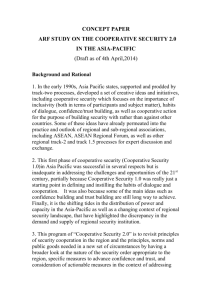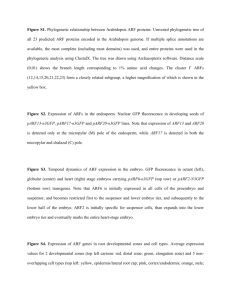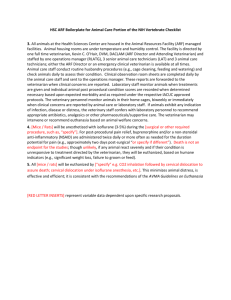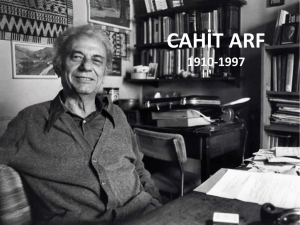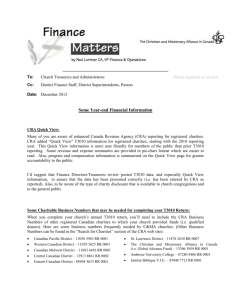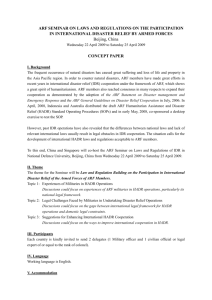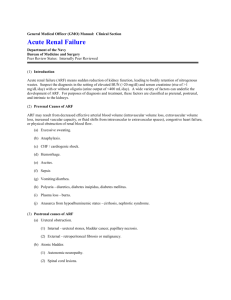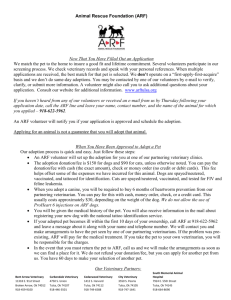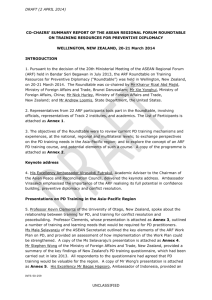Co-Chairs' Summary Report of the meeting of the
advertisement
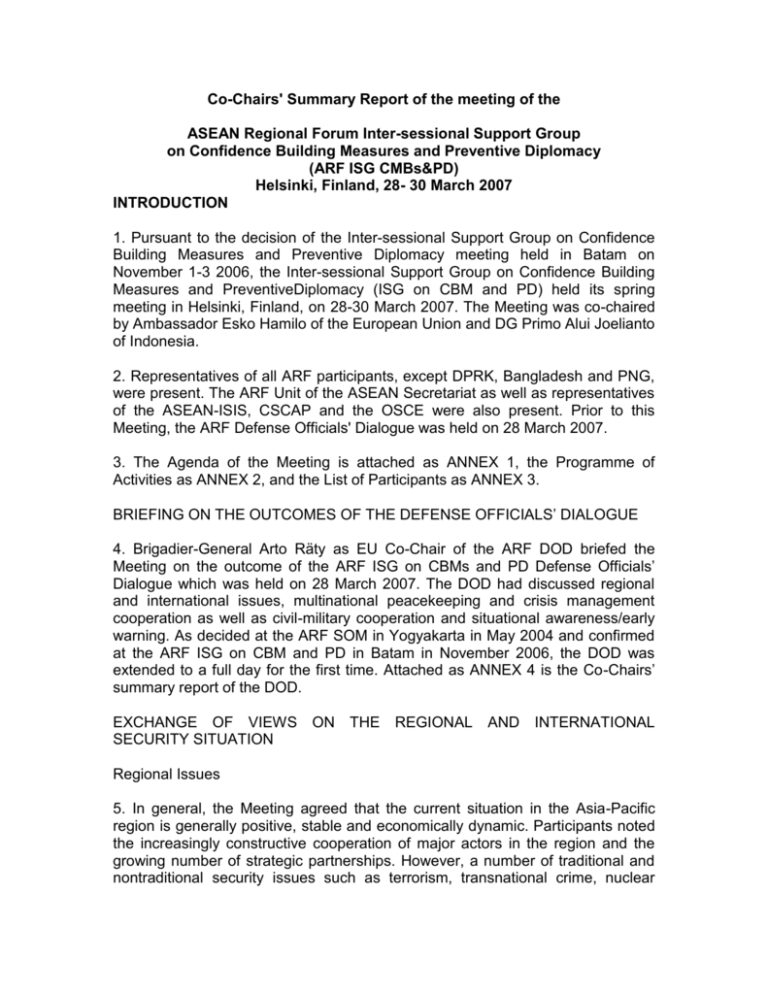
Co-Chairs' Summary Report of the meeting of the ASEAN Regional Forum Inter-sessional Support Group on Confidence Building Measures and Preventive Diplomacy (ARF ISG CMBs&PD) Helsinki, Finland, 28- 30 March 2007 INTRODUCTION 1. Pursuant to the decision of the Inter-sessional Support Group on Confidence Building Measures and Preventive Diplomacy meeting held in Batam on November 1-3 2006, the Inter-sessional Support Group on Confidence Building Measures and PreventiveDiplomacy (ISG on CBM and PD) held its spring meeting in Helsinki, Finland, on 28-30 March 2007. The Meeting was co-chaired by Ambassador Esko Hamilo of the European Union and DG Primo Alui Joelianto of Indonesia. 2. Representatives of all ARF participants, except DPRK, Bangladesh and PNG, were present. The ARF Unit of the ASEAN Secretariat as well as representatives of the ASEAN-ISIS, CSCAP and the OSCE were also present. Prior to this Meeting, the ARF Defense Officials' Dialogue was held on 28 March 2007. 3. The Agenda of the Meeting is attached as ANNEX 1, the Programme of Activities as ANNEX 2, and the List of Participants as ANNEX 3. BRIEFING ON THE OUTCOMES OF THE DEFENSE OFFICIALS’ DIALOGUE 4. Brigadier-General Arto Räty as EU Co-Chair of the ARF DOD briefed the Meeting on the outcome of the ARF ISG on CBMs and PD Defense Officials’ Dialogue which was held on 28 March 2007. The DOD had discussed regional and international issues, multinational peacekeeping and crisis management cooperation as well as civil-military cooperation and situational awareness/early warning. As decided at the ARF SOM in Yogyakarta in May 2004 and confirmed at the ARF ISG on CBM and PD in Batam in November 2006, the DOD was extended to a full day for the first time. Attached as ANNEX 4 is the Co-Chairs’ summary report of the DOD. EXCHANGE OF VIEWS ON THE SECURITY SITUATION REGIONAL AND INTERNATIONAL Regional Issues 5. In general, the Meeting agreed that the current situation in the Asia-Pacific region is generally positive, stable and economically dynamic. Participants noted the increasingly constructive cooperation of major actors in the region and the growing number of strategic partnerships. However, a number of traditional and nontraditional security issues such as terrorism, transnational crime, nuclear proliferation, communicable diseases and natural disasters continued to pose serious threats to regional security and required even more multinational cooperation. The ARF was well placed to intensify such cooperation and to take concrete action. Participants noted written contributions by India (ANNEX 5) and Mongolia (ANNEX 6). 6. The Meeting welcomed the resumption of the Six Party Talks and 13 February 2007 Joint Statement. The Meeting reaffirmed the 2005 Joint Statement and the objective of bringing about denuclearization of the Korean Peninsula and maintaining peace and stability on the Korean Peninsula and Northeast Asia. Participants praised the constructive role played by China. However some participants reaffirmed their concern that the DPRK’s nuclear weapons programs continued to pose a threat to regional and global peace and security. Participants urged DPRK to make a full and complete declaration of all its nuclear programs and to disable its nuclear facilities and called on the DPRK to engage substantively in the process, which is the most viable mechanism for resolving the nuclear issue peacefully. The Meeting called on the Parties to fully carry out their commitments. The meeting affirmed their strong support for UNSCR 1718, and full and effective implementation of the measures it mandates. Furthermore, participants noted the progress in inter-Korean exchanges and cooperation and expressed their hope that it will continue to be conducive to peace and prosperity on the Korean Peninsula. Some participants expressed their concern over the remaining humanitarian issues including the abductions. 7. On Myanmar, participants expressed concern over the lack of genuine political reforms and delays in the transition to democracy. The Meeting urged Myanmar to release political prisoners, and to fulfill its commitments – including those made at the ASEAN Ministerial meeting in Kuala Lumpur in July 2006. Some participants deplored the humanitarian situation in the country, the treatment of ethnic groups, refugees and continued internal displacement. The Meeting urged Myanmar to act on advice from ASEAN members, neighboring countries and the international community, including the United Nations towards achieving national reconciliation, progress and inclusive democracy. Myanmar briefed the Meeting on the latest developments in the country, including the status of the work of the National Convention. Myanmar also expressed commitment to work with ASEAN members, neighboring countries and the international community to implement the Seven-Step- Roadmap to democracy. Myanmar clarified that the reported closing down of field offices of ICRC was only a result of a misunderstanding, which had been resolved. 8. Seeking to allay concerns, Thailand briefed the meeting on its recent internal developments, including the drafting of a new Constitution that would be put to a referendum in September 2007. Thailand underlined that the interim government was firmly committed to restoring democracy and holding free and fair elections by the end of the year. Some participants expressed confidence in Thailand’s commitment to achieve a swift restoration of democracy. 9. New Zealand and Australia expressed concern about the developments in a number of countries in the South Pacific, including the Solomon Islands and Fiji. Some participants called for swift restoration of democracy in Fiji and a general improvement of good governance in the region. 10. Some participants noted the volatile security situation in Timor Leste over the past 12 months, and expressed concern about a potential further deterioration in the lead up to, during and after the forthcoming Presidential and parliamentary elections. The need for strong international support was underlined. In response, Timor Leste informed the meeting of the state of election preparations and thanked several countries for their continued support. 11. Some participants underlined their continued support to peace and development in Afghanistan, the stability of which was crucial for the broader region and encouraged ARF members to consider ways to engage with Afghanistan. Pakistan mentioned that it had just intensified cooperation with the UNHCR to facilitate a solution of the remaining refugee issues and stressed that its relationship with Afghanistan could be further improved by making full use of the Tripartite Commission. Canada and others expressed concern regarding the return to active conflict in Sri Lanka and called for a political solution. 12. The Meeting also welcomed the improvement of the security situation in the South China Sea, particularly through the implementation of the Declaration on the Conduct of Parties in the South China Sea between ASEAN and China. While acknowledging the intensified regional cooperation, based on dialogue and rules, some participants stressed the continued need for the parties concerned to exercise self-restraint. International Security Situation 13. Participants regretted Iran’s failure to comply with the deadline set by UNSCR 1737 and welcomed the unanimous adoption of the new UNSCR 1747. The Meeting strongly urged Iran to comply with the new UN Security Council resolution and requirements set out by the IAEA Board of Governors and called on all UN members to fully and swiftly implement the measures set out in the new UNSC resolutions. The Meeting strongly urged a diplomatic solution in accordance with the relevant UNSC resolutions. 14. Some participants addressed the situation in the Middle East and called on all parties to follow the Roadmap and urged the international community to remain engaged and evenhanded. 15. Many participants underlined that generally the risk of proliferation of weapons of mass destruction and their means of delivery presented one of the greatest risks to global and regional security. Participants underlined the importance of adherence to relevant international instruments, conclusion of additional protocols to IAEA safeguards and CTBT, full implementation of UNSC resolution 1540. They commended the US, Singapore and Canada for the recent workshop on this matter. Many participants supported the draft ARF statement on the implementation of UNSC resolution 1540, which was tabled by the US (ANNEX 7). EXCHANGE OF VIEWS ON NON-TRADITIONAL SECURITY ISSUES 16. The Meeting discussed a number of developments in non-traditional security issues in the region, including illegal logging, trafficking in drugs and persons, natural disasters, haze problems, communicable diseases, maritime security and energy security. Participants agreed that addressing non-traditional security problems required a collaborative and holistic approach. The meeting noted a briefing by Mongolia (ANNEX 8). 17. Many participants underlined the crucial nature of the fight against terrorism, which required not only the adoption of international and national laws and the improvement of law-enforcement efforts but also better regional and international cooperation. Some participants called on parties who had not yet done so to adhere to existing UN conventions and join efforts to reach an agreement on the Comprehensive Convention on International Terrorism (CCIT). The meeting stressed the need to address factors contributing to recruitment into and support for terrorism while taking care not to equate terrorism with a religion or ethnic group. Furthermore, counter-terrorism efforts had to respect international law, in particular human rights and humanitarian law obligations. Non-ASEAN participants congratulated ASEAN on the signing of its Convention on CounterTerrorism during the 12th ASEAN Summit in Cebu in January 2007. 18. The Russian Federation tabled a draft ARF Statement on the Promotion of Inter- Civilization Dialogue (ANNEX 9) for consideration and possible comments from participants. A revised draft would be presented to the 5th ISM CTTC in Singapore, 2-4 May 2007, in view of a consideration by the SOM. 19. Some participants also briefed the meeting on their efforts to address other transnational crimes, including trafficking of persons and drugs as well as small arms and light weapons. Malaysia informed about its draft anti-trafficking bill and work to strengthen measures against money laundering. Laos introduced its drugs free programme and bill on money laundering. Indonesia encouraged participants to join its efforts to outlaw illegal logging and smuggling of natural resources through a UN Convention. 20. The meeting further addressed cross-border environmental problems. Thailand briefed on its continuous cooperation and sharing of information with neighboring countries and the ASEAN Secretariat in view of the haze problem in the north of the country. 21. Participants underlined the need to further expand the ARF’s body of work on disaster relief. China informed the meeting that it would continue drafting ARF guidelines on disaster relief with a view to making a compilation of the existing international practices, having regard to the practical needs of the Asia region (current second draft in ANNEX 10). China planned to table a revised version on the basis of additional comments by delegations. China also informed that ten ARF participants had submitted the Survey Form on Stocktaking ARF Disaster Relief Resources and Capacities and invited ARF participants to make further submissions. The meeting also noted a revised concept paper by Indonesia for the establishment of an ARF standby arrangement for immediate humanitarian assistance (ANNEX 11). 22. Many participants underlined the importance of continuing work on maritime security and praised the recent first ARF Maritime Security Shore Exercise convened in Singapore in January 2007. 23. Several participants noted the importance of continuing the ARF activities in energy security, as launched by the first ARF Seminar on Energy Security in Brussels on 5-6 October 2006. The meeting took note of the follow-on activity to be hosted by Singapore, to be co-chaired again by the EU. 24. Some participants reported on their work against anti-personnel landmines, small arms and light weapons and MANPADS. With 6 of the 10 ASEAN members now signatories to the Ottawa Convention on anti-personnel mines, Canada expressed hope for more active Asian participation in the work to further its implementation. The Meeting was also reminded of the need to continuously update the ARF Unit on the contact points on small arms and light weapons. REVIEW AND CONSIDERATION ON CONFIDENCE-BUILDING MEASURES AND PREVENTIVE DIPLOMACY 25. The Meeting noted a list of activities implemented since (ANNEX 12) was briefed on the following ARF activities undertaken since the Batam ISG on CBM and PD on 1-3 November 2006: a. Singapore – ARF Maritime Security Shore Exercise in Singapore on 22-23 January 2007, preceded by a Planning Conference in Singapore on 7-8 December 2006 (ANNEXES 13 and 14). b. The US, Canada and Singapore – ARF Workshop on Implementation of United Nations Security Council Resolution 1540, San Francisco, USA, 13-15 February 2007 (ANNEX 15). c. Malaysia and Australia – First ARF Peacekeeping Experts' Meeting Port Dickson, Malaysia, 7-9 March 2007 (ANNEX 16). 26. The Meeting took note of updates concerning the following planned activities for the remaining inter-sessional year 2006-2007: a. India confirmed the hosting of a seminar on Peacekeeping, 26-28 April 2007 in New Delhi. b. Singapore to host the ISM CTTC, 2-4 May 2007, to be co-chaired with Japan and Russia (ANNEX 17). 27. Announcements of activities for the inter-sessional year 2007-2008, to be endorsed by the SOM in view of Ministerial approval: a. Indonesia to convene an ARF Round Table Discussion on Stocktaking of Maritime Security Issues in Jakarta on 23-24 August 2007, to be co-chaired with China (ANNEX 18). b. Australia to co-sponsor with Indonesia an ARF Desk Top Exercise on the Disaster Relief in Indonesia in 2008, preceded by a planning meeting in Australia in the second half of 2007 (ANNEX 19). c. China to host and co-chair with Thailand a Seminar on Narcotic Control to be held in Xian City on 19-21 September 2007 (ANNEX 20). d. Australia to host the 11th ARF Heads of Defence Colleges / Universities /Institutions meeting (HDCUIM), 9-11 October 2007. e. The EU announced that it would host and co-chair with Indonesia the 7th ISM on Disaster Relief, in 11-12 October 2007 in Finland. f. ROK to host the 4th ARF Seminar on Cyber Terrorism in the second half of 2007. g. The Philippines to convene an ARF Seminar on the Law of the Sea in 2007. h. US to host and co-chair with Singapore and China the 1st ISM on nonproliferation in 2007-2008. i. Malaysia to organize the ARF Workshop on Anti-Money Laundering in Kuala Lumpur in the fourth quarter of 2007 or early 2008 (ANNEX 21). j. Singapore to host and co-chair with the EU a follow-on activity to the first ARF Seminar on Energy Security in early 2008, to be co-chaired by the EU (ANNEX 22). k. EU to host and co-chair with Indonesia a workshop on CBMs and PD in Asia and Europe in Berlin in early 2008 (ANNEX 23). l. New Zealand to host and co-chair with Singapore the 2nd ARF Peacekeeping Experts Meeting in 2008. m. Malaysia to host an ARF Seminar on Anti-Personal Landmines in Kuala Lumpur in mid 2008 (ANNEX 24). n. The Philippines and the US to hold the ARF Live Exercise on Voluntary Demonstration of Response on Disaster Relief in the Philippines in early 2009. This Exercise will be a follow-up on the Table Top Exercise on Disaster Relief to be co-hosted by Indonesia and Australia. VOLUNTARY BACKGROUND BRIEFINGS 28. The meeting took note of the following voluntary briefings made by ARF participants: a. Indonesia – Introduction of the ASEAN Convention on Counter-Terrorism (ANNEX 25). b. Indonesia – Briefing on a sub-regional meeting on counter-terrorism (ANNEX 26). c. Australia – Australian Delegation Visit to the DPRK on 11-14 March 2007 (ANNEX 27). d. Japan – Transition from Japanese Defense Agency to Ministry of Defense (ANNEX 28). e. Cambodia – Convening of the Conference “Mine Action: Implication for Peace and Development” co-hosted by Cambodia and Canada in Phnom Penh, on 1114 March 2007. FUTURE DIRECTION OF THE ARF EEPs 29. The Philippines briefed on the outcomes of the Second Plenary Meeting of ARF experts and eminent Persons (EEPs) in Manila on 5-6 February 2007 on the issue of Multilateral Security Cooperation in Northeast Asia (ANNEX 29). The Philippines and ROK introduced a discussion paper reviewing the practicability of the recommendations by EEPs (ANNEX 30) and invited comments from participants by 30 April. A revised paper will be discussed at the SOM. Update on the Proposed Study on Preventive Diplomacy 30. The ARF Unit briefed on the revised proposal for the ARF Fund Project on the Study on Preventive Diplomacy (ANNEX 31) and invited participants to register their voluntary contributions with the ASEAN Secretariat in May. It remained the intention to complete the study in time for the first ISG meeting in the next inter-sessional year 2007-2008. ARF Chair 31. The Philippines reported to the Meeting that comments had been received on the latest draft of Terms of Reference for Friends of the ARF Chair as circulated for the Batam ISG meeting in November 2006. The Philippines hoped to reach a consensus on the draft ToRs before the upcoming SOM in view of their adoption by Ministers this year. Some participants stressed that it was high time to create such a mechanism that the ARF had already discussed for some time. Working Methods 32. In view of enhancing the overall efficiency of the ARF and streamlining procedures, the US launched the idea of introducing open-ended working groups to help prepare for ISMs and bundle work on the various ARF issues (ANNEX 32). 33. While several delegations expressed strong support for this suggestion, others underlined that ensuing questions such as the potential additional workload, transparency and channels of communication would have to be addressed with a more general, long-term perspective. In addition, Indonesia suggested the utilization of the existing Track II institutions and EEPs to avoid overburdening ARF participating countries. 34. The EU announced that it would table a paper on ARF working methods in good time for the SOM proposing to transfer some decision-making on CBMs to the SOM and to create an expedited procedure for urgent decisions on ARF activities. 35. In view of the wealth of new activities proposed at this meeting alone, India suggested that the ARF Unit assist the participants to cluster activities so as to avoid overlap and use resources better. This issue could be further discussed in the ARF SOM. 36. The meeting took a positive view regarding the possibility of establishing an ARF ISM on non-proliferation of WMD as a way of streamlining the ARF’s work on non proliferation and recommended the proposal for approval by the SOM (proposal in ANNEX 33). Links with Other Organizations Enhancing Ties between Track I and Track II 37. Ms. Malayvieng Sakonhninhom, Acting Director General of the ASEAN-ISIS briefed the Meeting on the Flagship Projects and Achievements of ASEAN-ISIS and Its Challenges (ANNEX 34). 38. Professor James Veitch of New Zealand, co-chair of the Council of Security Cooperation in Asia Pacific (CSCAP) presented the breadth of activities of the CSCAP (ANNEX 35) and suggested that ARF Track I activities could benefit from closer cooperation with the CSCAP’s working groups. He extended an invitation to all ARF participants to attend the CSCAP general conference in Jakarta in December 2007. 39. The Meeting expressed appreciation and support for forging closer cooperation between Track I and Track II and encouraged greater utilization of track II expertise within track I. Indonesia suggested that practical cooperation between ARF experts and the respective CSCAP working groups could be enhanced by organizing meetings back-to-back. 40. In addition, Indonesia also suggested closer cooperation between ARF EEPs and the Track II organizations. In response, Dr. Carolina Hernandez on behalf of the CSCAP co-chairs declared a readiness to establish closer linkage between ARF Tracks I and II but also underlined the need to separate clearly between the tracks as to allow track II representatives to play their independent, advisory role. EEPs belonged to a category of their own, as some of them were government officials or still working closely with governments. Enhancing Ties between ARF and Other Regional and International Security Organizations 41. Mr. Oleksandr Pavlyuk, Head of External Co-operation Section at the Secretariat of the Organisation for Security and Cooperation in Europe (OSCE) gave a presentation on the development, structures and activities of the OSCE and the potential for strengthening ties with the ARF. He informed the Meeting that OSCE has invited the Chairman of the ARF to the Asian Contact Group Meeting. On the basis of a comprehensive security concept, the OSCE had developed a wider range of CBMs, on which it would be worthwhile exchanging experience with the ARF. The OSCE would also be ready to host a visit of the ARF Unit. 42. Some participants underlined the importance of expanded ARF-OSCE cooperation in the context of improved region-to-region cooperation. Additionally, Russia proposed to forge closer cooperation between the ARF Unit of the ASEAN Secretariat and the Secretariat of the Shanghai Cooperation Organization (SCO). PREPARATIONS FOR THE SOM AND MINISTERIAL MEETINGS 43. The Philippines briefed the meeting on the preparations for the next Senior Officials Meeting on 25 May that would be preceded by a Defence Officials Dialogue on 23 May and the ARF Security Policy Conference (ASPC) on 24 May. The Philippines further confirmed the dates for the 14th ARF Ministerial in Manila for 2 August, to be preceded by a Defence Officials’ Dialogue on 1 August. 44. Canada and Singapore recalled the paper “Best Practices in Export Control”, the outcome of the ARF Export Licensing Experts Meeting convened in Singapore on 17-19 November 2005 (ANNEX 36), and encouraged the ARF Chair to insert a reference to this document in the 14th ARF Chairman’s statement. The Meeting noted that the document had already received SOM approval OTHER MATTERS 45. The Philippines requested ARF participants to file, by 1 June, their submissions for the 2007 Annual Security Outlook to be published in conjunction with the 14th ARF Ministerial Meeting. The meeting noted the contribution by China (ANNEX 37). 46. The Philippines further informed the Meeting on the request by Kazakhstan to be admitted as the 28th participant of the ARF to be officiated at the 15th ARF Ministerial Meeting in 2008 (ANNEX 38) of an earlier ARF decision to consolidate the ARF membership for the time being, ASEAN had noted the request. Russia reminded the meeting of the forth-coming admission of Sri Lanka to the ARF and expressed itself in favor of the admission of Kazakhstan. Japan recommended that new membership applications be discussed in depth by Senior Officials. 47. Brunei Darussalam and Canada announced their willingness to co-chair the ISG meetings in the next inter-sessional year 2007-2008. Participants noted the list of ARF ISG chairs (ANNEX 39).
